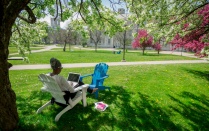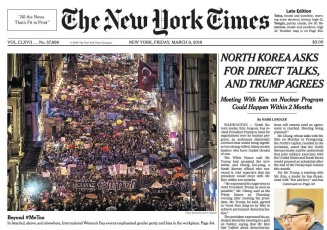Beyond the Classroom
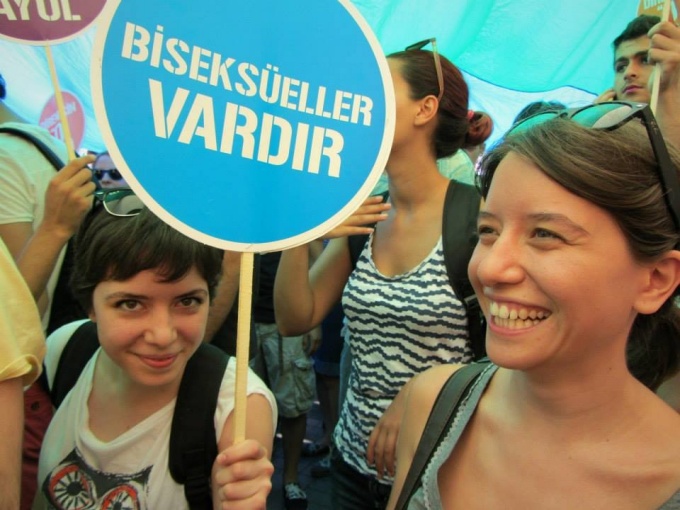
Graduate student Elif Ege (right) at the 2013 Pride March, Istanbul
Linking theory with practice is at the root of feminist and queer studies, and academic knowledge best proves its usefulness when it can be applied to drive real-life social change. Throughout their program, our graduate students have many different opportunities to make use of their knowledge beyond the classroom. Whether by doing research projects, interning with a local or national organization, or making an impact in the Buffalo community, the initiative to go above and beyond will open doors to a multitude of worthwhile experiences.
Jump To:
Research Abroad
As many of our graduate students come from abroad, and one of our key departmental research areas is global and transnational feminism and women's movements, a large number of students choose to conduct research outside North America in Asia, Africa, South America or Europe. To fund overseas research and travel, UB offers several scholarship opportunities, such as:
- The Isabel S. Marcus International Research Fellowship, offered by the UB Gender Institute
- The Mark Diamond Research Fund (MDRF), which offers grants to graduate students for research expenses related to their thesis or dissertation
Currently, our students may be found in:
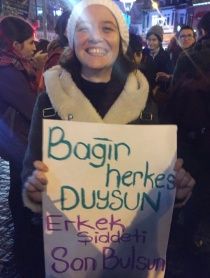
Elif Ege, Feminist Valentine's Day March, Istanbul
Elif Ege is currently doing her research on the Kurdish and Turkish women’s movements in Turkey and their multi-tiered collaborations and negotiations around the international norms and standards of women's rights across local, national and global levels of feminist activism.
Karolina Kulicka's research focuses on the Polish state administration from the gender perspective.
Thesis Title: "The Problem That Has No Name:” Mechanisms of Organizational Gendering in the Polish Civil Service”
"My dissertation research brings to light those forces behind gender inequity that are invisibly ingrained into seemingly gender-neutral organizational policies, practices and cultures. Using the example of the Polish state administration (often labeled as the most women-friendly in the world), this project analyzes how seemingly genderless institutional rules (e.g. political neutrality, professionalism), every-day work practices, spatial arrangements, new technologies, or the norms of the “right” looks can have a discriminating effect on female workers. My project argues that organizations are not just neutral sites of gender relations, but are themselves inherently gendered. Mechanisms of sustaining inequality can be unintentional, mundane, invisibly woven into the fabric of organizations, sustaining the architecture of exclusion. In an effort to eradicate institutional inequality, it is therefore important to redirect the focus from intentional acts of discrimination to systemic, institutional patterns of inequality. A critical feminist engagement with organizations (public, corporate, academic) can not only help to better understand how contemporary gender inequality operates, but also how organizational structures can be used to transform gender hierarchies and shatter the status quo of inequality."
Academic Conferences
Our students regularly present their papers and meet with scholars who share their academic interests at national and international conferences and conventions organized by renowned academic associations, including:
- National Women Studies Association (NWSA)
- American Studies Association (ASA)
- Middle East Studies Association (MESA)
- Modern Language Association (MLA)
- North East Modern Language Associatio (NeMLA)
When possible, the department offers financial support to help students cover the expenses of the conference participation.
Publishing
Our students also gain experience and academic visibility outside UB by publishing articles in national and international peer-reviewed academic journals. Some recent examples:
- Anne Marie Butler: "Fuck Your Morals: The Body Activism of Amina Sboui"
- Karolina Kulicka: "Not Refugees but Rapists and Colonizers: The 'European Migration Crisis' through Object-Relation Theory"
Students also write blogs and publish in local and national newspapers and magazines. Check out a recent Gender Institute blog post by student Hilary Vandenbark: "We need a culture shift, we need to listen to women: Reflections on #MeToo"
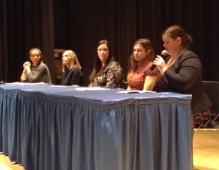
Students speak at the International Women's Day Panel 2017, organized under the supervision of Prof. Barbara Wejnert
While I was in the GGS master's program, I got to travel throughout the United States and abroad presenting at conferences. This was an amazing opportunity to not only advance my public speaking skills but to also see parts of the world I had never been to and meet new and interesting people.
Teaching
GGSs students also teach undergraduate classes and work as graduate assistants across the university. Our students have previously worked as assistants for the UB Gender Institute and at the UB Intercultural and Diversity Center.
Community Activism and Collaboration
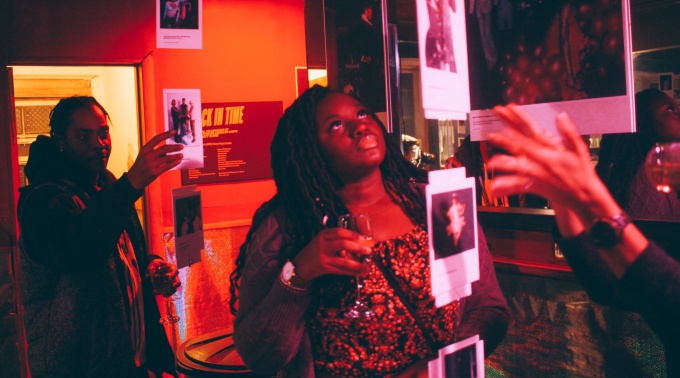
Exhibits from "Black in Time," a historical dance party commemorating Buffalo's LGTBQ African-American bar and party scence, co-sponsored by the Visual Studies program and UB Gender Institute, curated by GGSs students for the Buffalo-Niagara LGBTQ History Project and the Black Intelligent Ladies Alliance (BILA).
Students engage in community life and activism by taking part in discussions and presentations with on-campus academic groups like the Queer Studies Academic Workshop or the Feminist Research Alliance Workshop, and community organizations like the Buffalo-Niagara LGBT Historical Society.
"The best Sundays are spent screaming about inclusive feminism." – Graduate student Gabriella Nassif
Additionally, collaboration with local and national government institutions and non-governmental organizations helps students develop a practical perspective by connecting the academic classroom to the real world. Through an internship partnership with the Erie County Commission on the Status of Women, students research issues facing women in Western New York and develop policy recommendations to present to the County. In fall 2019, students focused on a variety of issues including home health care. In spring 2020, the interns collectively focused on sick pay policies. Email us to request a copy of the policy briefs.
Student Gabriella Nassif also worked as a research consultant at The Institute for Women's Studies in the Arab World – IWSAW, and Elif Ege was involved in organizing International Women's Day in Istanbul, pictured right.
Listen to a Gender Institute podcast about our internship program with Erie County.
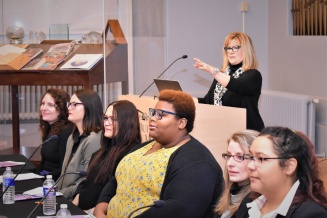
Students presented their policy research and recommendations at the Buffalo History Museum after the fall 2019 internship with the Erie County Commission on the Status of Women with Karen King.
Student Elif Ege helped organize International Women's Day in Istanbul, photographed for the New York Times.
